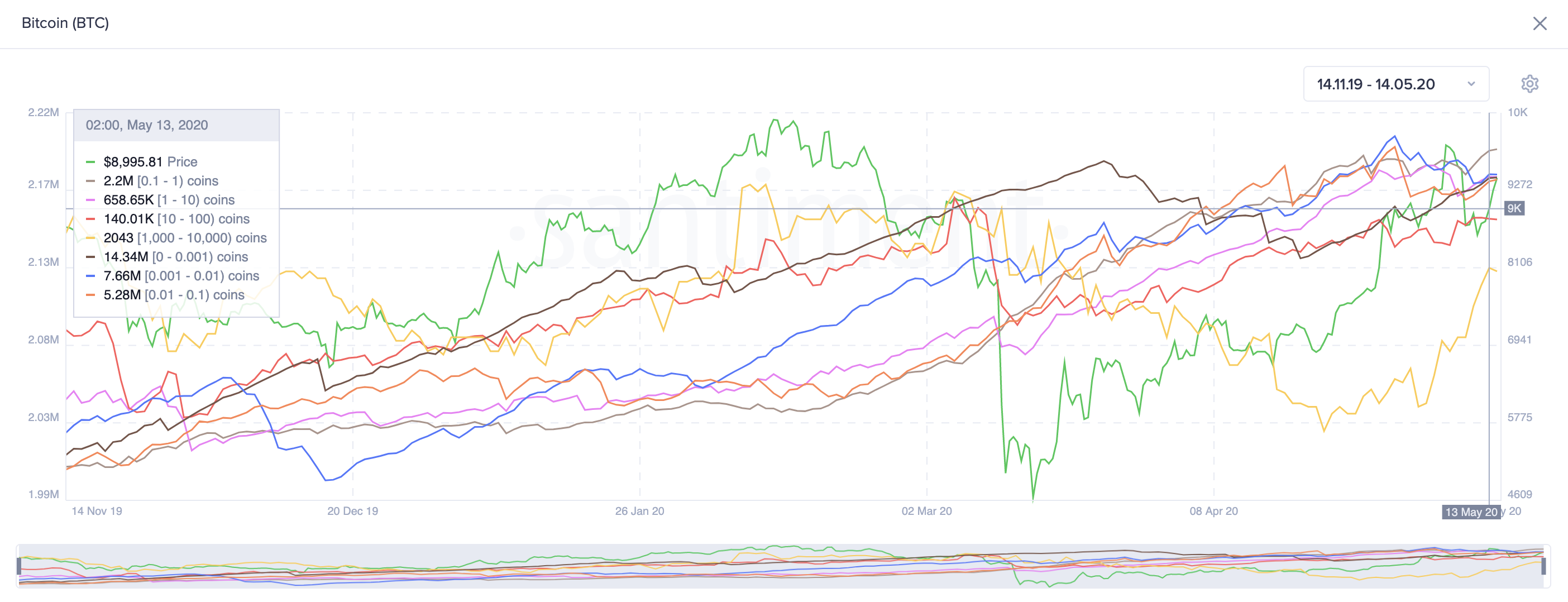
Bitcoin Takes Aim at Multi-Year Resistance as it Heads to $10,000
Bitcoin is up 21% since the recent halving, signaling that this event was the catalyst for a new bull market.
Bitcoin is breaking out as demand continues rising, but there is a major resistance barrier sitting ahead that could put a stop to its advance.
Demand for Bitcoin Is Skyrocketing
The bulls are back and are rapidly pushing the price of Bitcoin up.
The buying pressure behind the flagship cryptocurrency continues rising as the top crypto has surged over 20% in the past few days. Such a considerable upswing enabled BTC to recover the losses incurred over the weekend.
Now, some of the most renowned figures within the crypto community believe that this price action s a direct result of the recent halving.
Data from Santiment reveals that the number of BTC “hodlers” is increasing at an exponential rate.
Addresses with 0.001 to 100 BTC have gone parabolic over the past six months while big players with 1,000 to 10,000 BTC began accumulating in early April.

Though these data sets indicate that the demand is palpable, there are different ways to interpret the price action from a technical perspective.
The Infamous Golden Cross
First and foremost, Bitcoin appears to have formed a golden cross within its 1-day chart. This technical pattern developed the moment the 50-day exponential moving average crossed above the 200-day exponential moving average.
Some of the most prominent technical analysts in the industry see this pattern as one of the most definitive buy signals prior to a bull market.
The last two times the pioneer cryptocurrency saw a golden cross between its 50 and 200-day EMA developed in its daily chart was in April 2019 and late January 2020.
Following the first moving average crossover, BTC skyrocketed more than 157% to peak at a high of nearly $14,000 in June 2019.
After the most recent golden cross, Bitcoin went up 14.5% after it developed.
If history repeats itself, the golden cross that developed in the last two days could have the ability to push the price of the pioneer cryptocurrency further up.
A Narrow Trading Range
The appearance of a bullish golden cross coincides with the idea that Bitcoin’s price action has been contained within an ascending parallel channel since the March market meltdown.
Since then, each time BTC rises to the upper boundary of the channel, it drops down to hit the lower boundary, and from this point, it bounces back up again. This is consistent with the characteristics of a channel.
Now, Bitcoin appears to be moving above the middle line of the parallel channel since bouncing off the lower boundary.
If the pioneer cryptocurrency continues to trade within this range as it has done it in the past three months, it is reasonable to expect a further continuation towards the upper boundary of the channel.
This massive resistance barrier sits at $10,500, which is also around mid-February’s swing high.
From this point, a pullback to the middle of the channel or its lower boundary can be triggered, assuming that the ascending parallel channel continues to hold.
The Multi-Year Resistance Trendline
Nevertheless, there is another scenario in which the steep correction may come before Bitcoin hits the upper boundary of the aforementioned parallel channel at $10,500.
Since the December 2017 all-time high of nearly $20,000, a descending trendline can be drawn around each major peak that Bitcoin has reached. These include the late June 2019 peak of $14,000, the mid-July 2019 high of $13,200, the early August 2019 spike of $12,300, and the mid-February 2020 high of $10,500.
Although the strength of this resistance wall could be weakening over time, the fact that it has been tested so often indicates that it is still a major hurdle for BTC.
If the wall continues to have the strength seen in the past three years, Bitcoin is bound for a wild ride towards the ascending support trendline.
This level of support currently sits around $6,000. A move towards it could help flush out some of the so-called “weak hands” while allowing sidelined investors to get back into the market.
A new inflow of capital from this price point could help Bitcoin finally break the overhead resistance and march towards new all-time highs.
Bitcoin Moving Forward
With Bitcoin’s halving now written into the history books, there are a lot of reasons to be bullish.
Plan B’s stock-to-flow model estimates that after the recent supply shock, the market value of the pioneer cryptocurrency is set to increase by 10x. This translates into a BTC price of $55,000.
Even though it is too early to tell whether such an optimistic outlook is possible, many market players are paying close attention to the descending resistance trendline previously mentioned and the $10,500 level.
A further bullish impulse that allows Bitcoin to break above this price level would likely trigger FOMO (fear-of-missing-out) among investors. As market participants panic buy to get a piece of the price action, they will push BTC further up adding credence to the beginning of a new full-blown bull market.
Still, a steep correction may come before Bitcoin breaks above $10,500. Only time will tell which scenario will materialize first.
